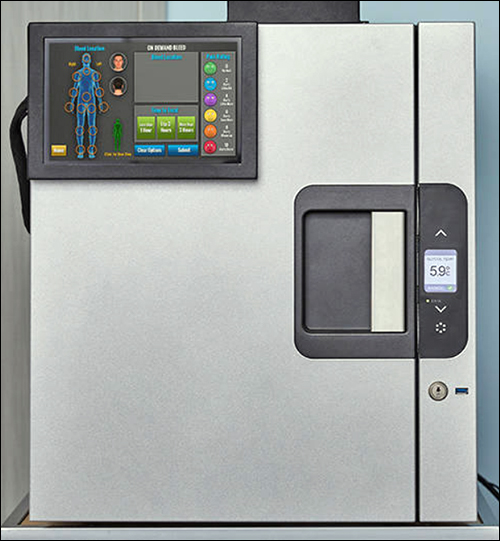Specialty pharmacy US Bioservices is piloting an in-home inventory-management program using RFID technology, with MedImpact Healthcare Systems, for monitoring the at-home use of medications by patients with hemophilia, a genetic disorder impairing the body’s ability to form blood clots. The system, consisting of passive UHF RFID-enabled coolers that track, in real time, which medications are being stored and which are being used, is intended to prevent the overstocking or expiration of medications, while helping health-care providers understand and manage each patient’s condition. The technology is provided by US Bioservices’ parent company, AmerisourceBergen.
US Bioservices provides patient support, including specialty medication and clinical care. Among its customers are patients with hemophilia who require drugs to manage their condition. Hemophiliacs typically live normal, healthy lives, but they require medication either as a prophylactic or when an injury occurs that could lead to bleeding. Typically, they keep these medicines on hand, since the drugs may need to be used on an emergency basis.
Like other medications, hemophilia drugs can be high-priced and have a specific shelf-life. They also require refrigeration to be effective, says Kevin James, US Bioservices’ payer strategy VP, so tracking them is critical—though this can be difficult to accomplish when the drugs are dispersed to the homes of patients who may or may not need to use them regularly. Patients typically store the medicines in their home refrigerators, making it easy to lose track of them or enable them to expire.
MedImpact Healthcare Systems is a pharmacy benefit manager (PBM) that provides home delivery of drugs for patients’ health insurance companies. The system being piloted is part of the firm’s MedImpact Direct Specialty Program pharmacy delivery service.
For the pilot, patients are using an AmerisourceBergen myCubixx refrigerator and cloud-based software to collect and manage RFID-based data from the cooler, which can then be made accessible to US Bioservices and MedImpact, as well as to the patient and health-care providers. Each of about a dozen participating patients will have the refrigerator installed in his or her home. The unit measures 1.8 cubic feet and can hold a month’s worth of medicine, depending on the size of the product being used. It comes with a built-in computer, a ThingMagic M6e RFID reader module and antennas, and can be plugged into a standard wall unit.
Each medication provided to a patient comes with a UHF RFID tag attached to its container, with a unique ID number encoded to that tag. Passive UHF RFID tags are attached at one of US Bioservices’ specialty pharmacies. That unique ID, stored in the US Bioservices software, is linked to details about the medication, including its quantity and expiration date, as well as any temperature storage requirements.
When a drug is placed inside the cooler, the reader captures the ID number encoded to its tag, then forwards that data to software hosted on a cloud-based server, via a cellular connection. The software links the medication with the cooler, along with the individual using that device. In that way, the patient, the health-care provider and the pharmacist can each view what medication is being stored there, as well as whether it is nearing expiration. Each time an individual removes a drug from the cooler, he or she must first provide information to the system.
The unit has a touch screen, known as a clinical interface, on its front. The door to the cooler is locked and will not open until the patient uses the interface. The user must first enter a four-digit code that serves as a password to launch the system. Next, he or she must respond to prompts to indicate why the cooler is being accessed. The touch screen prompts the user to select the part of the body that may have been injured, as well as where bleeding may be occurring and the pain scale. The door then unlocks and the patient can remove the medication. The system identifies which item was removed, based on the unique ID that it no longer reads inside the unit. If the user takes medication as a prophylactic, there are prompts to indicate that as well.
Every access to the cooler is captured by the software, as well as which medication’s tag is no longer being read inside the unit. Once the drug is returned to the cooler, data is updated to indicate this status. The system then knows how long the medicine remained out of the cooler, and thus how long it was exposed to room temperatures. The solution further knows that the individual had an injury and, generally, what that consisted of.
The system is intended to enable US Bioservices and MedImpact to determine when a patient may require a medication refill. Analytics from the data will also make it possible to identify whether a patient has more medicine on hand than he or she needs—for instance, if that person uses medication at a lower rate than anticipated.
The pilot, which began in July of this year, will continue for at least six months before being assessed, James says. The participants will assess the return on investment (ROI) the system provides, based on the reduced risk of medication expirations or over-stocking.
In the long term, James reports, “We could provide this solution with all of our pharmacies,” and to other PBMs and insurance companies. “Our role as a specialty pharmacy is to maximize positive clinical outcomes while minimizing cost.” The participants hope to learn about patient satisfaction, he says, based on the solution and the financial ROI.



